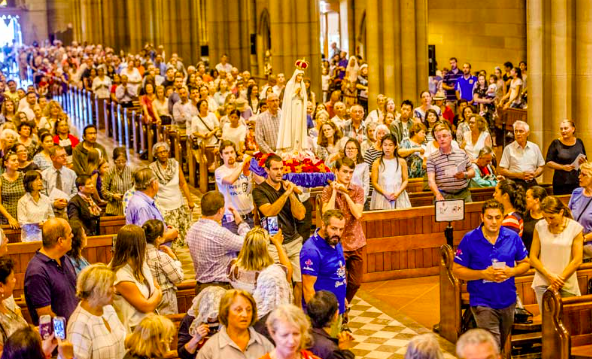I have a long held fascination with the rhetoric of the pro-life. From their church services to their clinic protests, the zeal with which they hold and express their views is unlike anything else.
In Sydney, the pro-life community is large, well-organised, and well connected. They are primarily faith oriented, though they would have you believe otherwise, and they boast substantial political and financial backing. The introduction of Safe Access Zones in 2018 did little to quell their commitment to the unborn: they simply changed form, mobilising their significant base to focus on lobbying in the lead up to the campaign for abortion decriminalisation in 2019.
****
They come together each year on the Sunday nearest to the Feast of the Annunciation to pray and protest at St Mary’s Cathedral. A fascinating study into the intersection of faith and politics within the movement, The Day of The Unborn Child has persisted through Safe Access Zones and decriminalisation, growing larger with each year. Until COVID-19.
The Day of The Unborn Child was officially cancelled on the 17th of March. “God bless you and be assured of our ongoing prayers in this time of crisis” concluded a post in the Facebook event, after detailing suggestions for interested Catholics to observe the date in the absence of the church service and protest. Before this, only a single post was made by the organisers — a link to a youtube video of last year’s events.
In previous years, attendees and organisers have been decidedly more vocal in their promotion of the march. This is largely due to the presence of a counter protest from the University of Sydney Women’s Collective, of which public promotion was absent this year. Without any notion of a publicly organised counter protest, there was nothing for them to post about — for all intents and purposes, they could safely assume that their event would go on without interruption.
This is not to say that they dislike the attention of a counter protest. I’d wager that they rather enjoy it — ever image conscious, the presence of a counter protest allows them to rally their followers with a fervour that would otherwise seem out of place. A visible and vocal enemy inspires a sense of righteousness, a reminder that the fight is still to be won.
Anyone can attend The Day of The Unborn Child. It is held in St Mary’s Cathedral, which is as much a tourist attraction as a place of worship. Despite this, it still feels out of reach. For one, it is exceptionally busy, as attendees from across the archdiocese forsake their usual Sunday service to take part. It’s highly attended by all leagues of the movement, from the Reverend Fred Nile to lesser known fascists and right-wing agitators. It’s also a day in observance of all unborn, not just the aborted ones — so the presence of a sceptical observer seems an intrusion. Despite this, I attended in 2019.
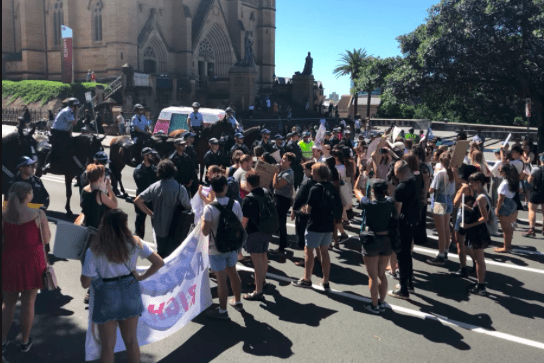
The experience was unnerving, to say the least. I had a male friend attend with me, hoping to project the air of a young, church-going couple. It was almost certainly obvious that we were a pair of inner-west interlopers. After the initial unease of walking into the middle of a pro-life church service wore off, I was satisfied. It was everything I had expected it to be: overtly political, well attended, and a little ominous. We left to join the protest across the road.
With the advent of COVID-19 and the Church’s move online, I looked forward to attending again this year. The lack of a counter protest had already lulled them into a sense of security. Surely, given the circumstances, the service would continue as planned, broadcasted online for all to see. The livestream would allow me a closer study, uninhibited by the risk of being recognised by one of the many unsavoury characters that would usually attend the church service.
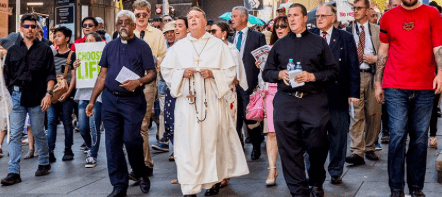
I was wrong. To put it bluntly, I felt robbed. In place of the usual fire and brimstone was a perfectly pleasant introduction and homily on the persistence of faith through COVID-19. “Amidst the panic-buying and hoarding, we must also remember to “store up treasure in heaven” more than toilet paper on earth!” Archbishop Anthony Fisher intoned to his empty cathedral, live-streamed to thousands of parishioners. Just two years earlier, the same Archbishop had addressed the same mass of “those who dispose of embryos, or have abortions, or drop bombs, or are part of a system that neglects children to death.”
Was the presence of a global pandemic more important than the unborn? Or was this a conscious decision, a pivot in branding from a church well versed in the practice of political respectability?
As they cancelled The Day of The Unborn Child, The Life and Family Institute implored attendees to hold their own events after Sunday service, in the form of processions, benedictions or rosaries. They also pointed to the presence of a lesser known, monthly procession and vigil in Surry Hills, due to take place on the Saturday before the now cancelled event.
This procession was once an important feature of the monthly calendar of the Helpers of God’s Precious Infants, the Sydney chapter of an international network of pro-life Catholics founded in 1989. Prior to the introduction of Safe Access Zones in 2018, they could be found outside the abortion clinic on Devonshire Street thrice weekly — maintining a “prayerful presence” that often ended in violence.
With such activity outlawed, the Helpers have been reduced to a single, monthly procession, starting at St Peter’s Catholic Church and making its way around the 150m perimeter of the clinic. It draws a sizable crowd, though nothing near the thousands that attend the Day of The Unborn Child.
It’s visually arresting, ritualistic in a manner that is not often seen outside of the physical structure of the church. The Helpers may claim that it is done in the name of faith, of “prayer in reparation for the sin of abortion”, but the true purpose is to intimidate. The function of such an event in the absence of pro-life “sidewalk counselling” is to remind the patients and staff of the clinic of their ever-watchful presence, that they are constantly mobilising to remove the reproductive rights recently won.
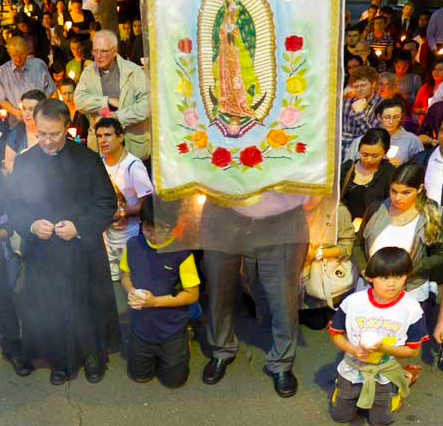
That the Life and Family Institute would direct the thousands of Unborn Child attendees to the monthly protest is significant. It would be a mistake to assign it to a matter of practicality, of directing the crowd to a smaller event with a lesser chance of being shut down by COVID-19 restrictions. This is an example of the sophistication of the pro-life movement in Sydney. By preemptively cancelling their protest, they were able to divert their supporters toward a more immediate show of strength, one that is more relevant as the advent of COVID-19 further limits access to abortion. In doing so, they allow the church to affect a public face of respectability in the wake of the pandemic — so that Archbishop Anthony Fisher can jest about toilet paper, as the anti-abortion project continues out of view.
In between Facebook posts decrying the closure of churches in response to COVID-19, Family Life International advertised the spiritual replacement for the Day of The Unborn Child. Organised by the Life and Family Institute, the event instructs interested Catholics to adopt an “unborn child” through prayer. The unborn child in question is one that is “in danger of abortion”, with whom the person praying is spiritually linked after an initial prayer.
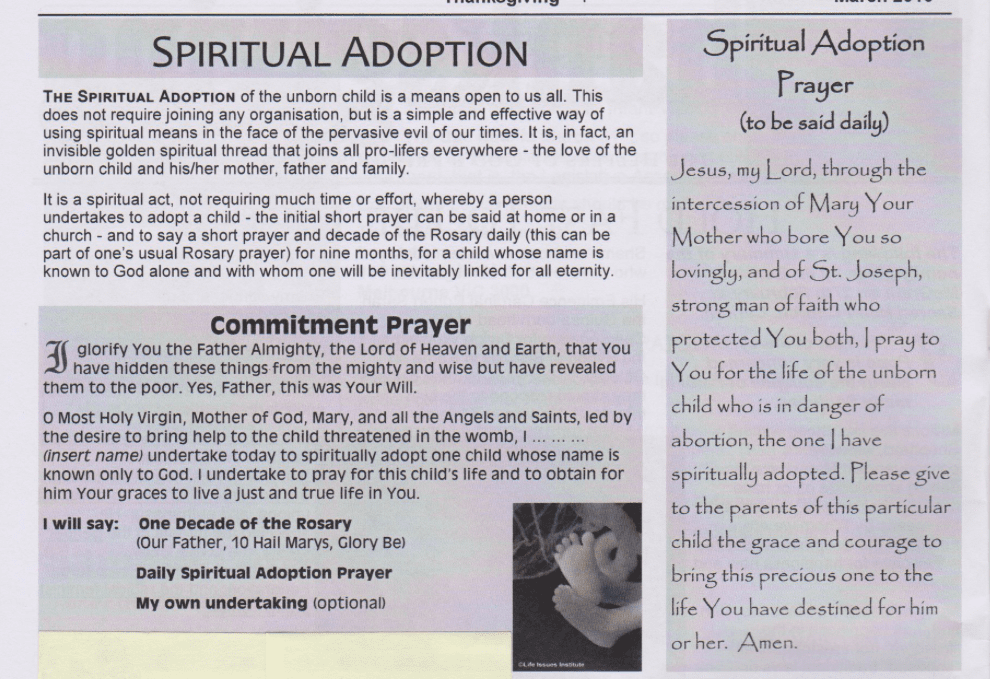
A spiritual adoption is an individual practice, a far cry from the clinic vigils and parliamentary processions of the Day of the Unborn Child. Nonetheless, it provides an interesting insight into the way that contemporary pro-life Catholics observe the Feast of the Annunciation — the date that the Virgin Mary was visited by the Angel Gabriel, and conceived Jesus Christ.
The Day of The Unborn Child and The Feast of The Annunciation are not inextricably linked. The former is a modern political invention, emerging in the late 1990s under the pontificate of John Paul II. The latter has been celebrated since the 5th century AD. Their relationship, particularly the way that both are observed in Australia, is indicative of the Church’s attitude towards abortion at large. Though motivated by faith, it is ultimately political. In 2020, without the show and media attention of a mass procession to parliament, where is the strategic sense in continuing the Day of the Unborn Child? By delegating it to organisations such as the Life and Family Institute and Family Life International, the Archdiocese is able to wash its hands of any controversy.
The Day of The Unborn Child will continue in 2021, unblemished by the advent of COVID-19. If anything, the pandemic will inspire new vigour amongst the pro-life right. With a global health crisis straining our already fraught health system, our reproductive freedoms are more at risk than ever.




